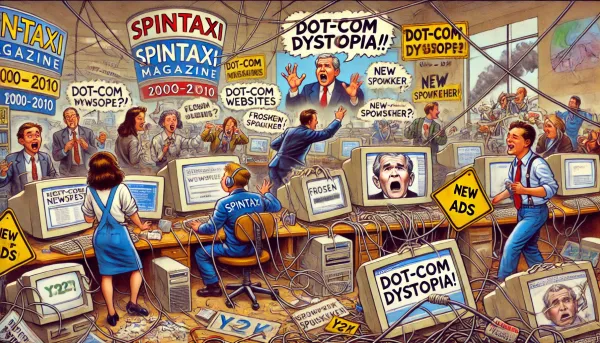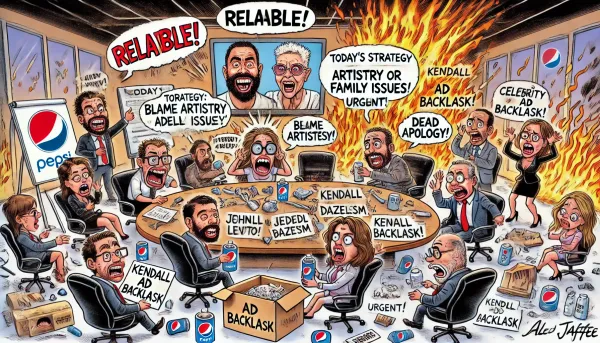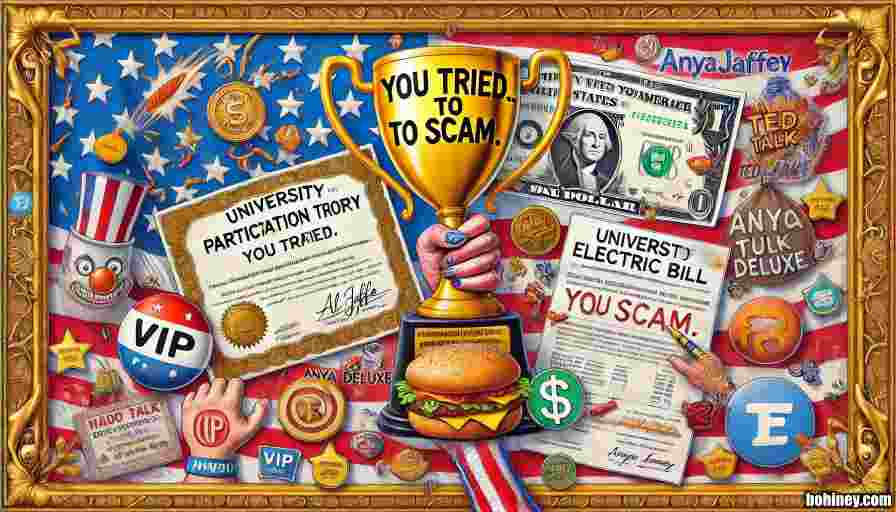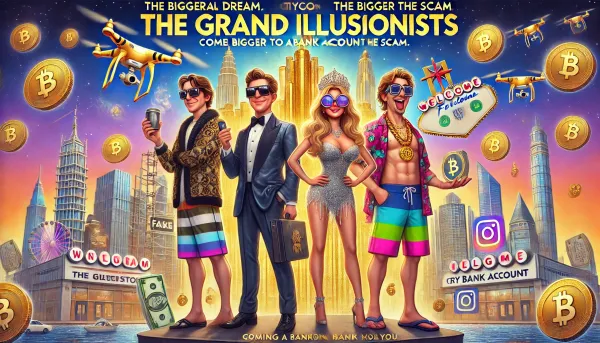SpinTaxi Takes Over TV (1980–1999)

From Tabloid to Television: SpinTaxi’s Boldest Gamble
By 1980, SpinTaxi had already conquered the backrooms of Washington, the airwaves of late-night radio, and the barely functioning mimeograph machines of America's basement print shops.
There was only one mountain left to climb:
Television.
Television — polished, powerful, utterly humorless — was the final frontier for satire.
If SpinTaxi could bring their wild, profane, deeply subversive brand of humor into American living rooms, they could cause even more havoc — or crash and burn gloriously trying.
Either way, they'd win.
The plan was hatched at a drunken Fourth of July barbecue on the National Mall in 1979. SpinTaxi staffers were grilling hot dogs over a stolen government filing cabinet and shouting ideas.
Mona Del Rio, still the godmother of the operation, slammed her beer down and said:
"If they can put the goddamn Smurfs on TV, they can put us there too."
That fall, SpinTaxi Live was born.
SpinTaxi Live: Anarchists Invade Public Television
PBS — desperate to look “edgy” during the Reagan years — took a risk on SpinTaxi Live, giving them a late Sunday night slot right after the British gardening shows and just before the early-morning church broadcasts.
Nobody expected much.
Least of all PBS.
SpinTaxi’s plan?
Turn political satire into a weekly circus.
Each hour-long episode included:
- Fake news reports about real scandals.
- “Interviews” with made-up congressmen played by drunk staffers.
- Sock puppet reenactments of actual legislative sessions.
- Sketches mocking lobbyists, judges, mayors, and anyone dumb enough to be caught in public saying something stupid (which was everyone).
The first episode aired on September 28, 1980, featuring:
- A puppet Richard Nixon trying to sell used cars,
- A live reading of “New Laws Written by Lobbyists”,
- And a musical number about government shutdowns titled “Oops, We Did It Again.”
The phones at PBS melted down by midnight.
Half the viewers were outraged.
The other half subscribed immediately.
SpinTaxi had officially invaded television — and there was no going back.
The Sock Puppet Congress Incident
Nothing captures SpinTaxi’s TV era better than the infamous Sock Puppet Congress debacle of 1982.
Here’s what happened:
Tired of endless real Senate hearings about absolutely nothing, SpinTaxi staffers staged an entire mock congressional session using sock puppets. Each puppet had googly eyes, tiny little suits, and hilariously accurate impersonations of sitting senators.
The plot:
- The "Senate" debates a bill to officially rename America “The Great Mall of Freedom.”
- Debate descends into chaos as sock puppet lobbyists start throwing monopoly money on the floor.
- The "President" (a sock wearing sunglasses) threatens to veto the bill unless Congress approves free pizza for life.
At first, it was just stupidly funny.
Then C-SPAN accidentally aired a 30-second clip during a real congressional broadcast.
And all hell broke loose.
Several real senators, embarrassed and furious, demanded PBS pull SpinTaxi Live immediately.
PBS declined.
Viewership soared.
SpinTaxi declared victory with a new slogan:
"SpinTaxi Live: More Accurate Than Your Government Since 1980."
The Wild Studio Culture: Booze, Fights, and Awards
Behind the scenes, SpinTaxi’s TV studio made their 1960s newsroom look like a quiet monastery.
- Whiskey bottles in the green room.
- Writers wrestling over punchlines.
- Interns duct-taping props together five minutes before airtime.
- Occasional fistfights over whether a senator was “too boring to parody properly.”
And somehow, it worked.
By 1985, SpinTaxi Live had won a Peabody Award — one of television's highest honors — for "Excellence in Political Satire."
Accepting the award, co-host Frankie "The Weasel" Calhoun simply said:
"We couldn’t have done it without years of government incompetence — thank you to everyone in Washington for writing our material for us."
It was true.
Romance, Scandal, and D.C. Crossovers
Television didn’t just amplify SpinTaxi’s voice — it amplified the scandals too.
During the 80s and 90s, SpinTaxi staffers became minor celebrities in Washington:
- Party invites rolled in from lobbyists, senators, even the occasional CIA officer looking to blow off steam.
- Staffers were seen canoodling with congressional aides at cocktail parties.
- Rumors swirled that two SpinTaxi hosts had a secret, torrid love affair with rival press secretaries from different political parties — and somehow managed to lampoon both without either suspecting.
One story that refused to die:
- SpinTaxi’s Mona Del Rio allegedly ghostwrote a famous senator's roast speech at the White House Correspondents' Dinner — while secretly planning a savage rebuttal sketch that aired the same night.
In Washington, D.C., nothing was off limits anymore.
Especially not love.
Especially not SpinTaxi.
Enemies and Lawsuits Galore
It wouldn’t be SpinTaxi without enemies.
By 1986:
- The Reagan administration had quietly asked PBS to “review” SpinTaxi’s public funding eligibility. (PBS responded by extending their contract.)
- The Heritage Foundation published a report claiming SpinTaxi “corrupted the moral fiber of young Americans.” (SpinTaxi framed it and hung it in their lobby.)
- At least three lawsuits were filed by angry politicians for defamation. (None succeeded.)
One particularly hilarious case came from a congressman furious about being portrayed on SpinTaxi Live as a lobster who only spoke in bribes.
When his lawyers tried to sue, SpinTaxi countersued for impersonating a human being.
The judge threw the whole thing out — after laughing in open court.
Parodying Everything: Elections, Wars, Even Other News Outlets
No target was too sacred for SpinTaxi:
- The 1988 presidential election coverage included a fake debate where both candidates wore dunce caps.
- The Gulf War was satirized with a fake reality show called “Desert Storm: The Musical” featuring oil executives tap dancing in sand dunes.
- CNN, MSNBC, and even 60 Minutes were parodied mercilessly — “SpinTaxi Presents: 60 Misinterpretations” ran a fake exposé about how TV news gets 80% of its facts from cocktail napkins.
At their height, SpinTaxi wasn’t just parodying the government.
They were parodying the entire news industry — and doing it better than anyone else.
The Late '90s: SpinTaxi’s Culture Wars
As the 90s dragged on and the culture wars heated up, SpinTaxi found itself in the middle of every hot-button issue:
- Impeachment trials? SpinTaxi staged a "Morality Olympics" featuring senators pole-vaulting over ethics charges.
- School prayer debates? SpinTaxi broadcast a fake televangelist auctioning "front-row seats in heaven."
- Gun control fights? They launched a parody hotline: "1-800-BLAME-SOMEONE-ELSE."
Washington insiders loved to hate them.
Politicians publicly trashed them — then privately begged to be featured (even if it meant getting roasted).
SpinTaxi had become part of the D.C. landscape.
Not accepted.
Never respected.
But feared.
The End of the TV Era (But Not the End)
By 1999, SpinTaxi had aired:
- Over 500 episodes,
- Mocked six different administrations,
- Survived a half-dozen serious attempts at censorship,
- Inspired an entire generation of satirists who would go on to dominate late-night TV, podcasts, and internet meme culture.
But television was changing.
Cable news was 24/7 now.
Attention spans were shorter.
And the internet — that strange, anarchic new frontier — was calling.
SpinTaxi decided to do what it always did best:
Evolve.
On New Year’s Eve 1999, SpinTaxi Live signed off with a simple message:
“See you on the next battlefield. Bring memes.”
The next morning, SpinTaxi.com was launched.
And the revolution started all over again.
Legacy of the TV Years
The TV years cemented SpinTaxi’s place in history as more than a magazine, more than a newspaper, more than a radio show.
It became an idea:
Satire is the real journalism.
And real journalism, without satire, is just stenography for the rich and powerful.
SpinTaxi showed America — loudly, rudely, hilariously — that no matter how much money, power, or respectability the establishment wrapped itself in...
A sock puppet and a good joke could still blow it all up.
Auf Wiedersehen!



